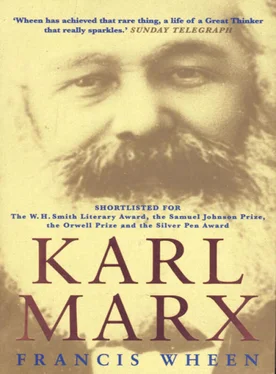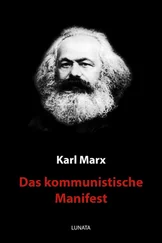This stinging reprimand – which is also a brilliant description of Marx’s lifelong working methods – was delivered in December 1837, when Heinrich was already dangerously ill with tuberculosis. It sounds like the last desperate howl of a dying man who has placed all his hopes in the next generation – only to see those hopes crumpled like so much waste paper. Fortifying himself with a fistful of pills prescribed by his doctor, he hurled grievances galore at the wastrel son. Karl scarcely ever replied to his parents’ letters; he never enquired after their health; he had spent almost 700 thalers of their money in one year, ‘whereas the richest spend less than 500’; he had weakened his mind and body chasing abstractions and ‘giving birth to monsters’; he never returned home during university holidays, and ignored the existence of his brothers and sisters. Even Jenny von Westphalen, who had previously been praised to the skies, was now revealed as yet another irritant: ‘Hardly were your wild goings-on in Bonn over, hardly were your old sins wiped out – and they were truly manifold – when, to our dismay, the pangs of love set in … While still so young, you became estranged from your family …’ True enough; but this litany of complaint was scarcely calculated to reunite them. Karl’s parents begged him to visit Trier for a few days during the Easter vacation of 1838; he refused.
The truth was that Marx had left his family behind. The distance between them can be gauged by a letter from Heinrich in March 1837 suggesting that Karl make his name by writing a heroic ode: ‘ It should redound to the honour of Prussiaand afford the opportunity of allotting a role to the genius of the monarchy … If executed in a patriotic and German spirit with depth of feeling, such an ode would itself be sufficient to lay the foundation for a reputation.’ Did the old man really think that his son would wish to glorify either Germany or its monarchy? Perhaps not. ‘I can only propose, advise,’ he conceded ruefully. ‘You have outgrown me; in this matter you are in general superior to me, so I must leave it to you to decide as you will.’
Heinrich Marx died, aged fifty-seven, on 10 May 1838. Karl did not attend the funeral. The journey from Berlin would be too long, he explained, and he had more important things to do.
During his three years at Berlin University, Marx was seldom in the lecture hall and often in debt. The death of his father meant an end to the regular stipends but also relieved the paternal pressure to apply himself to legal studies. ‘It would be stupid,’ Bruno Bauer advised, ‘if you were to devote yourself to a practical career. Theory is now the strongest practice, and we are absolutely incapable of predicting to how large an extent it will become practical.’ The task of the Young Hegelians was to infiltrate the academy and establish their theories as the new received wisdom. Marx began work on a doctoral thesis which would qualify him for a lectureship, taking as his subject ‘The Difference Between the Democritean and Epicurean Philosophy’.
He could not have chosen a less propitious moment, since it coincided with a new and thoroughgoing purge of Hegel’s left-wing disciples. Eduard Gans, the last Hegelian in the faculty of law, died unexpectedly in 1839 and was replaced by the severely reactionary Julius Stahl. Bauer himself was evicted from the theology department soon afterwards and forced to seek refuge at the University of Bonn. As recently as 1836 Bauer had argued, with some vehemence, that religion should remain above and beyond philosophical criticism; now he was proclaiming his atheism from the rooftops. He urged Marx to get on with the dissertation and join him in Bonn as soon as possible. Another young radical predicted that ‘ if Marx, Bruno Bauer and Feuerbach come togetherto found a theological – philosophical review, God would do well to surround Himself with all His angels and indulge in self-pity, for these three will certainly drive Him out of His heaven’. Luckily for God, He had Prussian friends in high places. After the accession of Friedrich Wilhelm IV to the throne in 1840 the persecution of dissidents was redoubled, strict censorship imposed on all publications and academic freedom extinguished.
Stranded in inhospitable Berlin, Marx no longer bothered to attend the university. By day he sat in his lodgings, reading and writing and smoking; in the evenings he colloquised and caroused with the kindred souls at the Doctors’ Club, who were keeping their spirits up by meeting almost daily. Though his explorations of Epicurus and Democritus might seem harmless enough, he knew that there was no question of submitting his thesis to the Berlin professors – especially since it would be scrutinised by F. W. von Schelling, a veteran anti-Hegelian philosopher who was brought into the university in 1841 at the personal command of the new king to root out unhealthy influences. Despite its apparently dry subject, Marx’s comparative study of Democritus and Epicurus was actually a daring and original piece of work in which he set out to show that theology must yield to the superior wisdom of philosophy, and that scepticism will triumph over dogma. His argument was laid down like a gauntlet on the first page:
As long as a single drop of blood pulsesin her world-conquering and totally free heart, philosophy will continually shout at her opponents the cry of Epicurus: ‘Impiety does not consist in destroying the gods of the crowd but rather in ascribing to the gods the ideas of the crowd.’ Philosophy makes no secret of it. The proclamation of Prometheus – ‘In one word, I hate all gods’ – is her own profession, her own slogan against all gods in heaven and earth who do not recognise man’s self-consciousness as the highest divinity. There shall be none other beside it.
In the spirit of belligerent mischief that was to be such a feature of his later polemics, Marx added a brief appendix mocking his own tutor’s loss of liberal faith. Quoting from an essay Schelling had written more than forty years earlier – ‘The time has come to proclaim to the better part of humanity the freedom of minds, and not to tolerate any longer that they deplore the loss of their fetters’ – he asked, ‘When the time had already come in 1795, how about the year 1841?’
Schelling did not have a chance to reply. Marx submitted his thesis instead to the University of Jena, which had a reputation for awarding degrees without delay or debate. He was obliged to attach his leaving certificate from Bonn (which mentioned the escapades with drink and firearms) and a reference from the Deputy Royal Government Plenipotentiaries at Berlin University, who found ‘nothing specially disadvantageous to note from the point of view of discipline’ except that ‘on several occasions he has been the object of proceedings for debt’. The Dean of Philosophy at Jena, Dr Carl Friedrich Bachmann, decided that these trifling misdemeanours could be disregarded, since the essay on Democritus and Epicurus ‘testifies to intelligence and perspicacity as much as to erudition, for which reason I regard the candidate as pre-eminently worthy’. On 15 April 1841, just nine days after sending his dissertation to Jena, Karl Marx collected a Ph.D.
Herr Doktor Marx was now ready to launch himself in the world. But for the next year he shuttled aimlessly between Bonn, Trier and Cologne, apparently uncertain of what to do next. His thesis had been dedicated ‘to his dear fatherly friend, Ludwig von Westphalen … as a token of filial love’, and during several visits to Trier he pointedly ignored his own surviving parent, devoting himself to the ailing Baron (who was to die in March 1842) and the patient Jenny, whose adoration of her ‘little wild boar’ was as intense as ever in spite of his lengthy absences. ‘ My little heart is so full, so overflowing with love and yearning and ardent longing for you, my infinitely loved one,’ she wrote. ‘It is certain, isn’t it, that I can marry you?’ Of course, of course, he agreed, but not just yet. The marriage would have to be postponed until he had found gainful employment, since his wretched mother had stopped his allowance and withheld his share of Heinrich Marx’s estate.
Читать дальше












